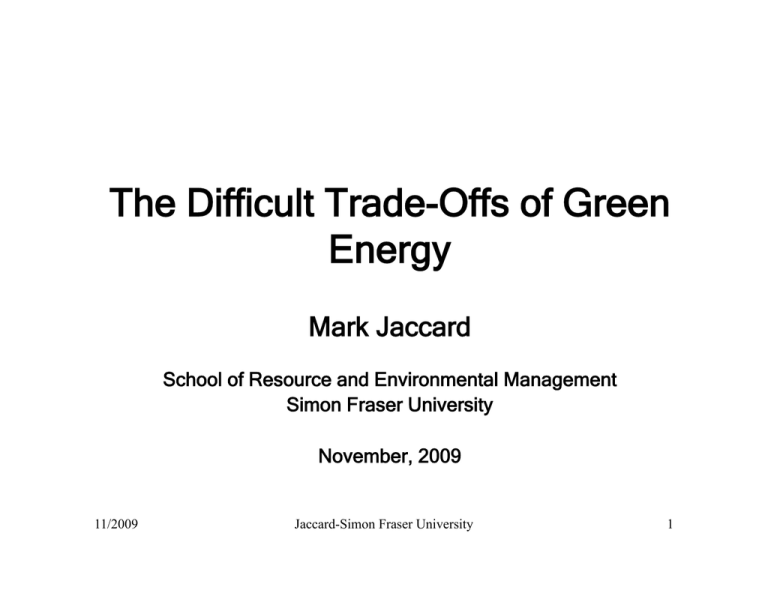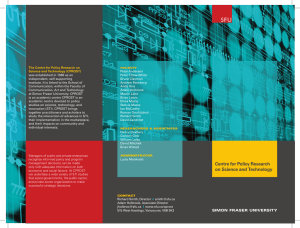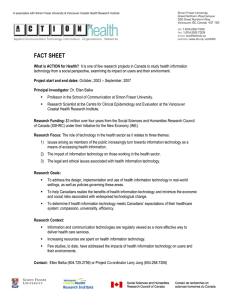The Difficult Trade-Offs of Green Energy Mark Jaccard
advertisement

The Difficult Trade-Offs of Green Energy Mark Jaccard School of Resource and Environmental Management Simon Fraser University November, 2009 11/2009 Jaccard-Simon Fraser University 1 Green energy – a meaningless term? We easily fall for “good guy – bad guy” terms like green consumerism, green cities, green corporations, green energy – even green coal mining! In reality, all energy options involve impacts and risks, and therefore tradeoffs when making energy supply decisions. Issue #1 If someone says, “Option A has impacts so I oppose it,” ask: (1) what is their Option B? (2) by what criteria, with what weighting, do they compare A to B? Possible criteria – – – – – 11/2009 GHG emissions (increasingly dominant) Local environmental impacts Local social impacts and benefits Financial costs and benefits Robustness (performance under a range of uncertain futures) Jaccard-Simon Fraser University 2 Energy options trade-off analysis 11/2009 Jaccard-Simon Fraser University 3 Using less energy: the case of electricity Issue #2 If someone says, we’ll just use less energy and we won’t have to build anything, ask: (1) what are the drivers of electricity use? (see chart) (2) how do we accelerate the rate of energy efficiency? (see charts on policy effectiveness) (3) how do our efficiency efforts in BC compare to elsewhere? (4) what happens to electricity use when we reduce GHG emissions? 11/2009 Jaccard-Simon Fraser University 4 (1) Drivers of electricity use: US household data Source: Steve Groves, SFU – diverse data sources, 2008 11/2009 Jaccard-Simon Fraser University 5 (2) Efforts to accelerate efficiency with subsidies * * Kwh/m3 * * * * * * * * average fridge efficiency * * * ** * * * * * * * * * * * * * * * * * * * * * * * * must accelerate efficiency trend 1950s 11/2009 1960s 1970s 1980s Jaccard-Simon Fraser University 1990s 2000s 6 (2) Estimated effectiveness of efficiency subsidies in Canada Rivers and Jaccard, 2009 11/2009 Jaccard-Simon Fraser University 7 (3) BC’s efficiency effort compared to other jurisdictions BC Hydro DSM methods and efforts (subsidies, info, evaluations) BC Hydro electricity pricing policies (inverted block) BC efficiency regulations (equipment, buildings) 11/2009 Jaccard-Simon Fraser University 8 (4) Effect of real GHG emissions cap and pricing policies A rapid increase in renewables (solar, wind, biomass, hydropower, geothermal), but only with supporting policies and a mature understanding by interest groups of difficult trade-offs. A dramatic increase in energy conservation and efficiency (technological and behavioural), but only with compulsory regulations, pricing and growing public awareness. A rapid shift toward electricity use for transportation (plug-in hybrid and battery electric vehicles), for heating buildings and water (heat pumps mostly), and for specific thermal applications in industry. 11/2009 Jaccard-Simon Fraser University 9 BC electricity consumption at different GHG price levels Source: CIMS simulation, 2009 11/2009 Jaccard-Simon Fraser University 10 Sources of increased BC electricity demand -$200 /tCO2 Source: CIMS simulation, 2009 11/2009 Jaccard-Simon Fraser University 11 Ownership issues: public versus private BC’s electricity policy under the NDP in 1990s and Liberals in 2000s is to encourage independent power producers. Is this a good idea? • Financial risk management for ratepayers and taxpayers? • Environmental protection and risk management? • Socio-economic development, local rights and equity? • Long-term benefits from favorable hydropower sites? 11/2009 Jaccard-Simon Fraser University 12 Suggestions for green energy trade-off analysis Avoid a priori conclusions – like “small is beautiful” or “decentralized is better” or “large hydro is better than small hydro” (or vice versa). Establish clear objectives (economic, environmental, social) and evaluative criteria (cost, local environmental impacts, global impacts, local community interests, first nations’ interests, provincial interests). Pay attention to cumulative effects. In the case of GHG emissions, this is easy. In the case of river basin usage, more difficult. Seek broad participation and consensus, but the latter may be difficult to realize, even with the best intentions. So central authority will still be necessary (BC Hydro acquisition planning, provincial environmental assessment, BCUC test of prudency, provincial cabinet). Don’t confuse trade-off analysis with policy questions that, while critically important, are separate issues – energy efficiency versus new supply, domestic energy security, public versus private ownership. 11/2009 Jaccard-Simon Fraser University 13



